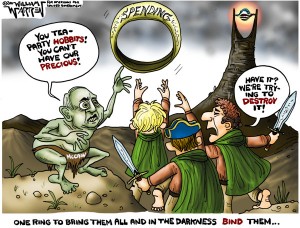
Shields’ statements came in defense of the RNC’s “Growth & Opportunity Project,” a 2012 post-mortem on things the GOP could do to attract more support and win elections in the future.
The controversial Breitbart headline, “RNC Declares War on Conservative Grassroots” drew a lot of heat from those who suggested Shields’ comments had been mischaracterized. A day later, RNC communications director Sean Spicer called Shields’ remarks “inartful” and said they were directed at “the beltway professionals whose focus is solely to make a profit off the party and movement and don’t share the same desire to win and enact conservative policies.”
GOP autopsy called for outreach to “advocacy organizations”
Ironically, the “Growth & Opportunity Project” had identified a “multitude of effective third-party groups that we will refer to as ‘Friends and Allies’ that serve as critical components of the Republican Party.” These included “advocacy organizations to think tanks to political action committees to SuperPACs to associations. Most of these friends and allies are legally organized as 527s, SuperPACs or 501(c) (4) organizations.”
The RNC report hailed such groups as “valuable additions to the public discourse, as educators and helpers in the work of persuading Americans to believe in our Party’s principles, and as important conduits of our Republican messages and beliefs.”
Were these the “professional right” Shields reportedly said should be removed from the party? Are these groups only “valuable” if they agree with the findings of the “Growth and Opportunity Project”? Is dissent tolerated at all in the party, particularly when there may be policy ramifications from any rebranding?
Why the grassroots distrusts Washington and the Party
Regardless of what was actually said at the meeting — the Ripon Society could confirm or refute the story easily by simply releasing a video of the event like it has consistently done for previous speakers — the story is emblematic of a bigger problem the Republican Party has.
That is, the conservative base of the party, its grassroots, has become increasingly distrustful of the party’s leadership in Washington, D.C. Even without a video, very few have had trouble believing the Breitbart story. And who could blame them?
Whether it is House Speaker John Boehner purging tea party members from committees, or Sen. John McCain out there calling the tea party “hobbits” and “whacko birds,” or Karl Rove’s American Crossroads declaring its strategy to wage primary battles against tea party candidates it deems to be unelectable — there really is a visible war between the establishment of the party and its base.
Adding insult to injury, more than 60 free market and limited government organizations took issue with the RNC’s new compressed presidential primary schedule and rules changes that critics argue will “centrally consolidate power” in the party.
Necessarily, it will also give even greater primacy to the first-in-the-nation Iowa caucus and New Hampshire primary — which are no longer red states as both voted for Obama in 2008 and 2012. Yet, no Republican in modern history has won the nomination without winning one of those two contests.
One could go on. Republican Governors John Kasich of Ohio, Rick Scott of Florida, Rick Snyder of Michigan, Jan Brewer of Arizona, and Bob McDonnell of Virginia have all laid the groundwork for Medicaid to be expanded by implementing Obamacare in their home states. Now, legislatures are the only thing that stands in the way of this massive increase of the welfare state.
Even more recently, Boehner has taken achieving additional spending cuts off the table by refusing to use the continuing resolution or debt ceiling votes as further leverage. In the meantime, Congress, with House Republican support, has suspended the debt ceiling until May 19, with no guarantee it will ever be reinstated — allowing the Obama Administration to borrow without limit as the national debt has soared to $16.8 trillion.
The real autopsy
As far as the RNC’s makeover goes, with its visible calls for Hispanic, Asian, female, and youth outreach — critics are concerned that implicit in the GOP’s rebranding is that the party leadership is calling for it to switch its policy positions on taxes, welfare, abortion, immigration, spending, and unions.
In short, many wonder whether the party is trying to be more like Democrats to appeal to groups it has historically done poorly with rather than selling the free market principles that have attracted majorities over time.
This is nothing new. It all started with the ego of Theodore Roosevelt who ran third party in 1912, giving the country Woodrow Wilson, the Federal Reserve, World War I, the income tax, and the United Nations’ precursor, the League of Nations. We are still reeling as a nation from the fallout.
Almost 50 years ago, in 1964, Phyllis Schlafly penned “A choice not an echo” to make the point that in order to compete, Republicans needed to offer a clear distinction with Democrats.
Ronald Reagan would make the same point 11 years later to Young Americans for Freedom calling for a “a new and revitalized second party, raising a banner of no pale pastels, but bold colors which make it unmistakably clear where we stand on all of the issues troubling the people.”
This was the real autopsy of the Republican Party. Reagan was arguing against a third party, based on a belief that that the modern GOP could be saved from its me-tooism that had weighed down the Nixon and Ford administrations, creating the Environmental Protection Agency, abolishing the Bretton Woods gold standard, and initiating wage and price controls.
An echo, not a choice
Reagan failed in his 1976 bid to take the Republican nomination from Gerald Ford, but in 1980 when he won the nomination, the media immediately called for him to name Ford as a vice presidential candidate, to create what Walter Cronkite called the “co-presidency.”
Even before Reagan had defeated Jimmy Carter, the establishment wanted to neuter him. To placate the moderates, George Bush was named the vice presidential nominee, and the country has been dealing with the Bush dynasty ever since.
Particularly, under the administration of George W. Bush, the nation dramatically expanded the Department of Education, implemented the prescription drug benefit that is bankrupting Medicare, waged a never ending war, blew up the housing bubble, nationalized Fannie Mae and Freddie Mac, and created the expansive regime for bank bailouts when the mortgage market collapsed.
After a brief flirtation with getting back to foundational principles in 2010 — when the tea party helped Republicans reclaim the House majority on a promise to get our fiscal house in order — any pretense to rolling back the size and scope of government has gone by the wayside.
Today, Republicans appear as merely an echo, not a choice. A party whose grassroots supporters are begging for it to stand up and fight, and whose leaders worry that if they stand for anything, they will lose power.
It has a policy problem, something the RNC as the party’s political wing will be hard-pressed to do anything about. In fact, the solution lies with the very voters who swept them into power in 2010. The tension between the two positions is natural and palpable.
For the inside-the-Beltway Republicans, real limited government candidates must not be allowed to run. And if they run they must not be allowed to win. And if they win, they must not be allowed to govern.
Senators like Rand Paul, Mike Lee, and Ted Cruz who are turning Washington, D.C. upside down in defense of constitutional principles never would have been allowed to emerge in the top-down prescriptive, safe candidate approach advocated by the institutional Republican establishment.
The grassroots has been spurned for over 100 years now. Since World War II, there have been arguably only two conservatives presidential nominees to the party, and only one of them got elected.
The real question is can the marriage between organizational Republicans and the grassroots be saved, and does either partner want it to be?
Robert Romano is the Senior Editor of Americans for Limited Government.






